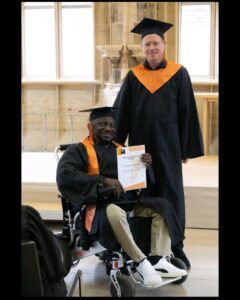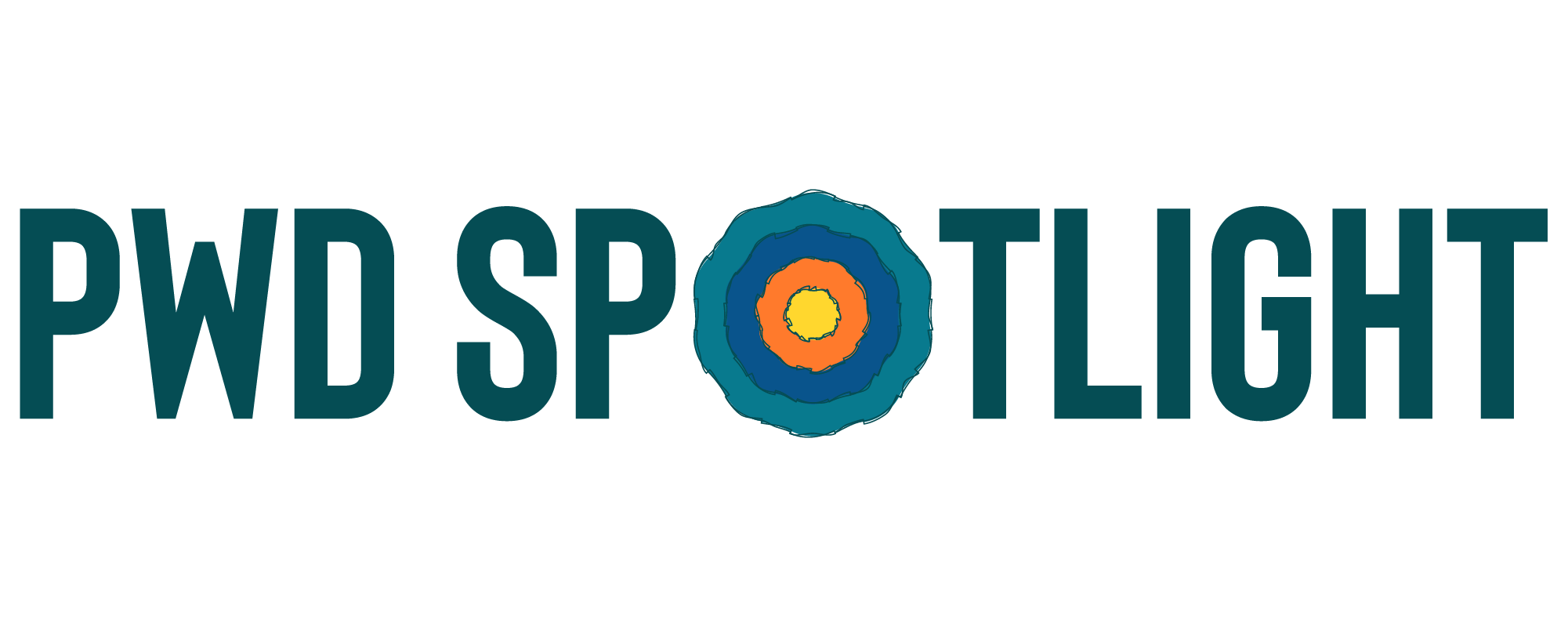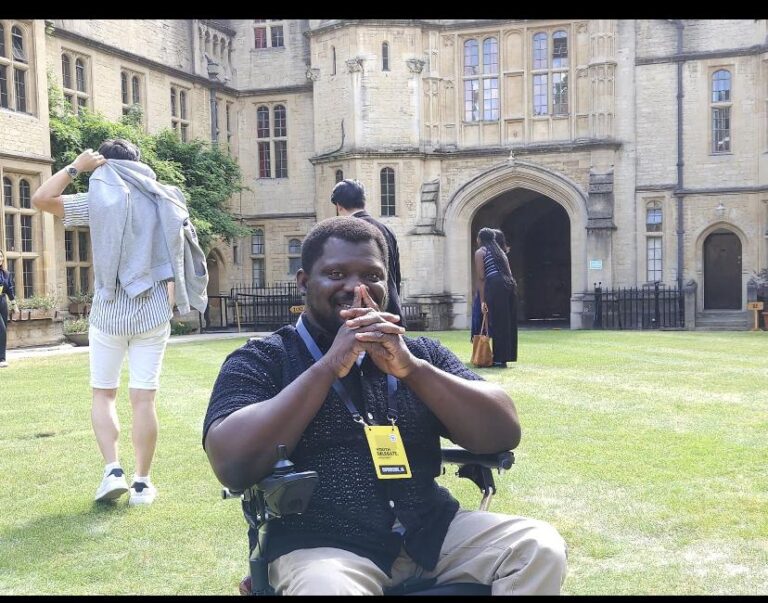Habeeb Adisa (Project Manager for PWDSpotlight) and Odeyinka Oluwatobi (Editor at PWDSpotlight sat virtually with Mr Idowu Adeyemi, a public policy expert, lawyer, and social enterprise co-founder.
This interview focuses on Mr Adeyemi’s personal experiences as a Person with Disability (PWD) in Nigeria’s educational and legal systems, his career achievements, and his work promoting inclusion through his organisation, Archivan.

PWDSpotlight:
How would you summarise your academic and non-academic experience at the University of Ibadan, particularly as an active student in the Literary and Debating Society?
Mr. Adeyemi:
Studying at the University of Ibadan was an interesting experience for me—it was a learning ground, a place to train, network, and meet many brilliant minds. However, it was also one of my earliest exposures to how uninclusive the Nigerian system can be, both in education and society in general.
As one of the few students with disabilities on campus, I had a wonderful academic experience, studying alongside some of the brightest peers and enjoying the intellectual atmosphere Ibadan is known for. The University of Ibadan is not only famous for its academic excellence but also for being a fertile ground for intellectual and extracurricular activities. I was very active in the Literary and Debating Society, as well as in disability rights advocacy. These experiences created beautiful memories for me.
However, as a person with a disability, it was extremely challenging. The institution was not inclusive in many ways—classrooms were inaccessible for those with mobility impairments, and there were no accommodations for students with visual or hearing impairments. My daily activities were rigorous and difficult because the systems were uninclusive.
For instance, the hostel bathrooms were in terrible condition—not even comfortable for able-bodied students—so you can imagine what it was like for someone with a disability. I also had to climb stairs with crutches to attend classes on the second floor, as there were no alternatives. There was no office or system to request classroom relocation or support, unlike universities abroad that have Diversity Offices to assist students with disabilities.
Despite all that, my time at Ibadan remains remarkable. The people, the intellectual camaraderie, and the memories were wonderful. But as a student with a disability, the experience revealed just how far we have to go as an institution and as a country.
PWDSpotlight:
Given those challenges — which seemed to make your journey twice as hard as that of a typical student — what motivated you to become a successful public speaker? How did that journey shape your experience?
Mr. Adeyemi:
Being a person with a disability in Nigeria is tough, not just at the University of Ibadan, but generally. Ideally, educational institutions should be models for inclusivity, but unfortunately, exclusion cuts across every sector in Nigeria — education, healthcare, and beyond.
Interestingly, I didn’t consciously decide to become a public speaker. I was simply fortunate to have people around me who spotted and nurtured my talent.
When I got into the Faculty of Law, I joined one of the student chambers called H.O. Davies Chamber. During an inter-chamber debate competition, volunteers were requested to represent the chamber, and I raised my hand without thinking much of it. After my first rehearsal speech, my senior colleague, Ogunyala Tunde, noticed my potential and encouraged me to join the Literary and Debating Society (L&D). He even paid for my membership form with his own money!
At first, I didn’t take it seriously, but I ended up joining the L&D Society and winning my first competition as Best Speaker. From then on, I took public speaking more seriously. I realised it was a way to demonstrate value beyond my disability—to ensure that people saw my abilities before my limitations.
The journey was not easy, but I had supportive friends, colleagues, and mentors like Dr Bisi Olawuyi and Dr Demola Lewis, who were speech coaches at the time. They encouraged me greatly. Public speaking taught me resilience, confidence, and the importance of representation for persons with disabilities.
PWDSpotlight:
That’s truly inspiring! Let’s talk about your journey to Oxford. How did that come about?
Currently, I’m a public policy practitioner with a background in law, and my focus has always been on social impact, governance, and inclusion.
I began my career as a Pupil Counsel at the Oyo State Ministry of Justice during my NYSC, and later worked at LM Solicitors in Ibadan, practising corporate and commercial law. But I always wanted to contribute to systemic change—not just individual impact.
This desire led me to pursue a Master’s in Public Policy at the Willy Brandt School of Public Policy, University of Erfurt, Germany, funded by the prestigious DAAD Scholarship. During that program, I began exploring more global opportunities for professional growth, which led to the ESA Youth Fellowship at the University of Oxford.
The fellowship, run in partnership with the Edward Institute of Strategic Alliance in the U.S., focuses on leadership and policy. I applied and, after a rigorous and highly competitive process, was selected. I was privileged to study at Brasenose College, University of Oxford, and it was a remarkable experience.
The fellowship expanded my perspective on leadership, policy, and social impact. The exposure, networking, and exchange of ideas have significantly enriched my work in promoting inclusion, especially within the disability space.

PWDSpotlight:
You’re also a trained lawyer. Given your background, do you think Nigeria’s judiciary is inclusive enough to protect people with disabilities?
Mr. Adeyemi:
When you think of great lawyers in Nigeria, how many persons with disabilities come to mind? Almost none. Not because we lack potential or brilliance, but because the system is fundamentally uninclusive. The problem is not just with the judiciary but with the entire Nigerian legal system. From legal education to professional practice, inclusivity is almost nonexistent.
For example, during my time at the Nigerian Law School in Abuja, I informed the authorities about my condition—post-polio syndrome—which affects my mobility and fine motor skills, making writing during exams difficult. Despite medical recommendations for extra time, the request wasn’t approved until the second-to-last paper.
This experience showed how poorly educated our institutions are about disability. Because my condition wasn’t visible, it was dismissed. The system understands visible disabilities, like visual impairment, but not invisible or complex ones.
We also face structural exclusion—most law firms are inaccessible to wheelchair users, lacking ramps or elevators. There’s also a deep-rooted bias that equates disability with inability.
Even though Nigeria enacted the Discrimination Against Persons with Disabilities (Prohibition) Act in 2019—the first such legislation in our democratic history—it still feels like a symbolic gesture rather than a genuine commitment. Implementation and awareness remain weak.
Until there’s systemic reorientation and institutional accountability, our legal system will continue to fail persons with disabilities.
PWDSpotlight:
You co-founded Archivan, a social enterprise. Could you tell us about its vision and objectives?
Mr. Adeyemi:
Thank you. Achievan is a social enterprise focused on promoting the workforce inclusion of persons with disabilities in Nigeria. We’re not an NGO, we are a business-driven social enterprise designed to create sustainable impact.
Our work is built around three key strategies: Advocacy, Capacity Building, and Technology.
- Advocacy:
We amplify disability issues through awareness campaigns and dialogues. One of our major initiatives is the Achievian Inclusion Conference, which brings together policymakers, corporate leaders, HR practitioners, and persons with disabilities to deliberate on inclusion and forge collaborative solutions.
- Capacity Building:
We organise training programs that equip persons with disabilities with relevant professional and tech skills—so they can compete effectively in the labour market. We don’t want inclusion to be seen as charity; we want it to be merit-based and empowering.
- Technology:
We’re exploring digital tools to promote inclusion. For instance, in Berlin, there’s an app that shows the accessibility level of public places. We want to develop similar innovations in Nigeria. Another inspiring example comes from Japan, where robots in restaurants are operated remotely by persons with disabilities who earn a living through it. These models show what’s possible with commitment and innovation.
Achievan began operations informally in 2019 and was officially registered in 2021. While we still rely on external funding and support, our long-term goal is to become a self-sustaining business that reinvests its profits into promoting inclusion.
We draw inspiration from successful social enterprises like Grameen Bank in Bangladesh, which provides microloans to low-income individuals. Similarly, Achievian aims to blend business sustainability with social impact—creating real, lasting change in the inclusion space.
PWDSpotlight:
That’s incredible. Thank you, Mr Adeyemi, for sharing your story and insights.
Mr. Adeyemi:
Thank you very much for having me. I appreciate the work PWDSpotlight is doing in amplifying the voices of persons with disabilities and promoting inclusion in Nigeria.

